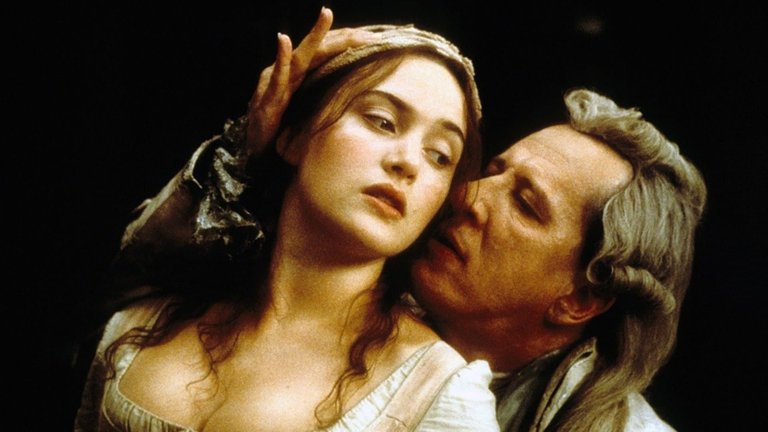Film Review: Quills (2000)

One of the great ironies of the Age of Enlightenment lies in the fact that among all the grand revolutionaries, thinkers, scientists and writers that marked that era the person most known to people today is Marquis de Sade (1740 – 1814), simply on the account of giving name to specific sexual perversion he had described in his erotic literature. De Sade’s life was at times as colourful as his writing and later became subject of films in which his character was played by wide variety of actors like Keir Dullea, Michel Piccoli, Daniel Auteill and Rocco Siffredi. One of the better knowns is Quills, 2000 period drama directed by Philip Kaufman.
The film is based on the play by American author Doug Wright, who also wrote the screenplay. The plot is set in 1807 France. Marquis De Sade (played by Geoffrey Rush), who had been imprisoned for years for various sex crimes, is now held in mental asylum in Charenton. The highly respected institution is run by Abbé de Coulmier (played by Joaquin Phoenix), idealistic Catholic priest who believes in humane treatment of patients, which includes art as therapy. In case of De Sade that includes rather luxurious cell where notorious libertine spends all the time putting his depraved fantasies on paper. This idyll comes to end after he convinces young maid Madeleine (played by Kate Winslet) to smuggle his writings to the outside world. When those writings begin to circulate in form of the novel, authorities led by Emperor Napoleon (played by Ron Cook) are outraged by its content and demand that De Sade’s writings are suppressed. Dr. Royer-Collard (played by Michael Caine), a physician, is sent to Charenton under the guise of supervising Coulmier’s work, but his actual task is to prevent De Sade from writing another word. Royer-Collard is complete opposite to Coulmier and his methods of treatment include various forms of physical torture. Coulmier gradually accepts Royer-Collard’s views and begin to take off De Sade’s privileges. But De Sade, fuelled by his inner demons, finds various ways to defy his tormentors.
Wright’s play and the film approached De Sade in rather unusual way, using his extraordinary story as an opportunity to explore eternal dilemma between freedom of expression and those who would suppress it for the sake of morality and public safety. Wright and Kaufman take the side in that debate at the very beginning through prologue set during the darkest days of French Revolution, in which De Sade’s fiction, regardless how depraved they may be, look harmless compared with the bloody reality of Reign of Terror, which turned the noblest ideals into their opposite. This clear stance was further confirmed by Kaufman when he stated that he had based character of villainous Royer-Collard on Kenneth Star, lawyer prosecuting Clinton during Monicagate affair, a person widely perceived as tyrannical prude by Hollywood and much of American left-wing establishment. That stance, however, begins to harm the film in later scenes, especially when it leads to too much poetic license in depicting certain historical facts. De Sade’s character is turned into some sort of martyr for free speech whose works managed to undermine Napoleon’s regime. In reality, Napoleon at the time was more concerned with fighting wars and running an empire than to pay much attention to scribblings of a incarcerated madman. All that could have been tolerated if Wright didn’t add a predictable but not very convincing subplot about Royer-Collard’s bride. Dramatic finale, which completely strays from real history, seems forced and damages the general impression of the film.
Conceptual problems Quills were, on the other hand, compensated with good execution and very good cast, which is dominated by Geoffrey Rush. While Wright and Kaufman probably imagined De Sade as nothing more than harmless eccentric, Rush took opportunity to present his character with an aura of unquestionable evil which nevertheless scandalises and fascinates moralists. This performance later allowed Australian actor to win Oscar nomination for his effort. Joaquin Phoenix is also good in the role of kind priest who slowly succumbs to De Sade’s negative influence. Kate Winslet is also good and Michael Caine looks quite comfortable in the role of a villain. Philip Kaufman was probably very good choice for director, because in his later works he had developed taste for explicit erotica, even to the point of inspiring NC-17 MPAA rating. Quills doesn’t lack rather explicit scenes, including some unusual sexual practices that were until that shown almost exclusively in pornographic films. Yet, Quills remains within limits of mainstream erotica and such content is accompanied by scenes featuring violence, gore and various bodily fluids, making the film at times not so pleasing for more sensitive viewers. Those who are able to watch Quills would at the end of the day be pleased despite film not fulfilling its potential.
RATING: 6/10 (++)
Blog in Croatian https://draxblog.com
Blog in English https://draxreview.wordpress.com/
Leofinance blog https://leofinance.io/@drax.leo
Unstoppable Domains: https://unstoppabledomains.com/?ref=3fc23fc42c1b417
Hiveonboard: https://hiveonboard.com?ref=drax
Bitcoin Lightning HIVE donations: https://v4v.app/v1/lnurlp/qrcode/drax
Rising Star game: https://www.risingstargame.com?referrer=drax
1Inch: https://1inch.exchange/#/r/0x83823d8CCB74F828148258BB4457642124b1328e
BTC donations: 1EWxiMiP6iiG9rger3NuUSd6HByaxQWafG
ETH donations: 0xB305F144323b99e6f8b1d66f5D7DE78B498C32A7
